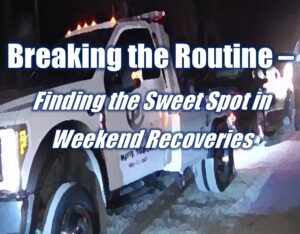EDITORIAL
It is in the news every day and it cannot be ignored. There is a chance for a violent encounter on every repossession assignment we work. If you follow Kevin Armstrong’s CU Repossessor online articles, it is obvious violence can happen anywhere at any time and should be a major cause for concern in our industry.
In the repossession industry it is obvious that this chance of potential violence and mayhem can never be removed but much has been done and can be done to mitigate the risk. Eagle Group has developed a premier safety training program, Situational Awareness, Confrontational Avoidance and De-Escalation Techniques (SACADET), to reduce risk and make recovery agents and camera car operators more aware of the importance of constant vigilance. This training module has been made available to anyone in the industry, free of charge, by Eagle Group XX/USA and Allied Finance Adjusters on the Allied web site.
Recovery agents and camera car operators have been confronted at the scene of the repossession, at their storage lots, and even just driving in a neighborhood or parked updating a file. How do we mitigate this risk?
BE PREPERED, BE ALERT, TRAIN HARD AND TRAIN SMART…
In an instant, an agent’s normal day can become a nightmare and a life-or-death struggle.
When we hear stories of agents being beaten, stabbed or shot, it’s easy to imagine what we would have done.
“I would not have been there at that time in the first place”
“I would have sped away”
“I would have fought back”
“I would have used a weapon”
But in many situations, when an attacker already has the upper hand—when your hands are on the wheel, your seatbelt is on, and you’re caught off guard—your options narrow quickly. The truth is, in the moment, even trained individuals can struggle to react.
One of the most important lessons I was taught in my early LE days, and it was heavily emphasized, was: never let yourself be taken to a second location. If something is going to happen make sure it occurs at the original scene of the encounter. If an attacker wants to move you, it’s because they plan to do something worse where witnesses won’t interfere. Statistics show your chances of survival drop dramatically once you leave the original scene.
That’s why it’s critical that you act before the attacker has the opportunity.
One viable option is compliance. Let the attacker believe they’re in control. Use body language to communicate, nod, agree, start a conversation agreeing to follow the attackers’ instructions. But while you’re doing that, you’re looking for one thing: an opportunity to get away or, as a final option, overpower your attacker.
Yes, “Run Forrest, Run!” should be your primary goal and remember the FBI’s 80% rule… There is an 80% chance the attacker will not shoot, if they do shoot there is an 80% chance they will not hit you, and finally, if they do hit you there is an 80% chance you will survive.
Yes… attempting to escape or overpower your attacker is risky but so is doing nothing. And the alternative may result in an outcome that is far worse.
Awareness Is Your Best Defense
The truth is, recovery agents and camera car operators are most vulnerable at the repossession sight as their attention is diverted to properly securing the vehicle to be recovered, verifying they have the correct vehicle, applying dollies, entering the vehicle to secure the steering wheel, confrontations with the consumer or third parties and we know there can be many other distractions; not on the road, not at the lot, but in those moments securing the vehicle to be repossessed. The reason agents are taught to go directly to the storage facility once they have a vehicle “on hook” is we have found that moving from one place to another, stopping at gas stations for fuel or coffee, parking lots where recovered vehicles are temporarily stored before transit to the storage lot, and dark side streets are common hunting grounds for people intent on doing harm.
That’s why situational awareness during the entire recovery process is so critical.
Agents and Camera car operators should follow these simple procedures:
BE PREPARED BY CONSTANTLY PLAYING “WHAT IF” …
- Constantly scan your surroundings.
• Lock your vehicle doors immediately after getting in.
• Don’t sit idly in your vehicle while distracted by actions on your computer or phone.
Preparedness doesn’t guarantee safety, but it stacks the odds in your favor and mitigates your level of risk.
My Final Thoughts
I hope this short message is a sobering reminder that in the asset recovery industry danger is always a present factor and violence doesn’t always come with a warning. In most volatile situations you may only get seconds to act in a manner that prevents injury or saves your or someone else’s life.
Train yourself, prepare yourself to recognize the threat, avoid violence, but always be ready to do what is necessary to survive and go home at the end of your shift.
My Fellow EAGLES, stay safe, watch your 6 and keep your head on a swivel.












More Stories
Bad Apples in the Repossession Industry
Why Self-Help Repossession Is Taken for Granted — and Why Losing It Would Hurt Consumers Most
A Necessary Distinction: Financial Oversight vs. Financial Control
When Oversight Becomes Overreach: Why Demanding Subcontractor Financials Is Wrong
Snitching vs. Standing on Principle: Calling Out Bad Actors in the Repossession Industry
Lender Interference in Georgia Repossessions